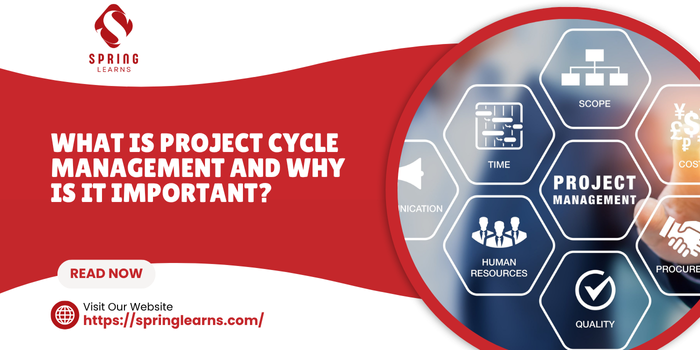
Project Cycle Management (PCM) means handling a project step by step, starting from the initial idea to the final finish. It helps to plan, do, and complete the project in a proper and organised way. It supports the team to stay on track, use time properly, and complete the project successfully without wasting money. The main aim of PCM is to deliver good-quality results, meet deadlines, and keep everyone involved happy.
PCM is a reliable method to handle and complete project work in a proper manner. It has been developed over the years and is used in many industries. It helps break down the project into simple steps, making it easy to manage and plan.
Key Benefits of PCM
PCM offers several advantages that make projects easier to manage and more successful:
This article will explain how PCM works and how it can help improve your projects.
How Project Cycle Management Works?
Project Cycle Management follows a structured system with different phases. Each phase is like a chapter in a book—you finish one before starting the next. This makes it easier to focus on goals and maintain quality throughout the project.
PCM uses key principles of project management like clear planning, risk awareness, teamwork, and transparency. It helps teams move step by step, with proper guidance at every stage. This improves the chances of completing the project successfully and on time.
Why is PCM important?
Large projects can feel confusing and hard to manage, especially when different people, deadlines, and risks are involved. Project Cycle Management training provides a proven system that simplifies everything and gives a clear path to follow.
There are three main reasons to use PCM:
Projects often have many moving parts. PCM breaks them into small, manageable phases. This makes the project easier to understand and handle, even when it's complex.
When the steps are easy to follow, the team can do their work more smoothly. Productivity increases because everyone knows what to do. This saves time and reduces stress. When people feel in control, they do their best work.
Clear communication is important in any project. PCM defines every phase clearly. This helps project leaders share progress with the team, stakeholders, and clients. Transparency builds trust and helps meet expectations.
What are the 5 cycles of project management?
The Project Cycle Management Course is divided into five main phases. These phases help guide the team from the start of the project to its successful end.
What are KPIs in project management?
KPI stands for Key Performance Indicators. These are numbers that show how well the project is going.
Common KPIs include:
KPIs help identify success and problem areas during project execution.
Documentation in Project Cycle Management
Documentation is an essential part of PCM. It includes:
Proper documentation ensures transparency, learning, and smooth handover in future projects.
How Project Manager Helps With Project Cycle Management?
A Project Manager plays a key role in every stage of the project cycle. They:
Through a good Project Cycle Management Course or Project Cycle Management Training, project managers can sharpen these skills and lead projects to success.
Grow Your Career Bigger and Better
Project Cycle Management is a practical and effective way to handle projects. It gives a clear structure, saves time and cost, and increases the chances of project success. PCM is especially helpful when managing big or complicated projects because it helps break them down into easy, manageable parts.
Springlearns is a top company that gives training in digital economy skills. We help people grow in their jobs and learn new things with fresh ideas. Now, you can join our PMP® Certification Training, which will help you get ready for the PMP exam. Using useful approaches like PCM, you can improve your career and reach new success.
Frequently Asked Questions
What is the main purpose of PCM?
The main purpose of PCM is to manage projects in a structured way to deliver quality results on time and within budget.
Is PCM only for big projects?
No, PCM works well for both small and large projects. It helps bring order and clarity to any size of project.
Who uses PCM?
Project managers, team leaders, and professionals across industries use PCM to manage their work more efficiently.
What makes PCM different from regular project management?
PCM follows a fixed cycle with defined phases. This ensures better planning, monitoring, and control throughout the project.
Can PCM reduce project risks?
Yes, one of the key goals of PCM is to identify and reduce risks early through better planning and monitoring.